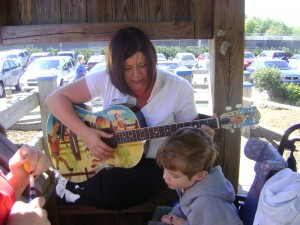 Article Written By student guest blogger: Tess Autin
Article Written By student guest blogger: Tess Autin
Music Therapist, Board-Certified
Master of Occupational Therapy Student, LSU-HSC New Orleans
Music has long been a fundamental part of each and every culture across the globe as a means of interaction and expression. Therapeutic benefits of music were first noted after World War I and World War II when musicians began singing and playing at hospitals for war veterans with physical and emotional trauma. Administrators observed noticeable positive changes in patients and commenced hiring musicians to deliver therapy using music. Since then, music therapy has formed into a profession with formal training through an accredited college curriculum, and the scope of practice has expanded to nearly every healthcare and educational setting. Although music therapy is now recognized as a credentialed and specialized occupation, there are several ways that anyone may utilize music in daily life to enhance experiences.
The next time you need to remember something, try singing it out loud or to yourself to a familiar tune. Chances are that you will be able to remember exactly what it is and it will remain engrained in your memory for some time. Why is this? Certain pathways of the brain are stimulated by music. These same pathways are responsible for memory and learning. That is why we often associate familiar songs with specific events in our lives. Even individuals with dementia are often able to sing along to familiar songs although communication may be impaired and they are unable to remember much else. Music may be used to promote wellness, manage stress, alleviate pain, express feelings, improve memory and communication, and promote physical rehabilitation.
 Suggestions for therapeutic activities using music include, but are not limited to: music listening for meditation and distraction; lyric discussion; singing of routines for memory retention; movement to music for range of motion and exercise; and instrument playing. Not only can the above goals be achieved, participants will have opportunities for social participation, emotional expression, positive reinforcement, and relaxation. Make an effort to encourage the use of music in everything you do, after all, it is the only language that binds all of us through the gift of rhythm and melody.
Suggestions for therapeutic activities using music include, but are not limited to: music listening for meditation and distraction; lyric discussion; singing of routines for memory retention; movement to music for range of motion and exercise; and instrument playing. Not only can the above goals be achieved, participants will have opportunities for social participation, emotional expression, positive reinforcement, and relaxation. Make an effort to encourage the use of music in everything you do, after all, it is the only language that binds all of us through the gift of rhythm and melody.
For more information on the profession of music therapy, please visit the American Music Therapy Association’s website at www.musictherapy.org
[youtube]IPd8ZcZsJWM[/youtube]